Kumarsain | |
|---|---|
Town | |
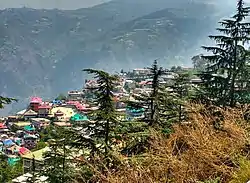     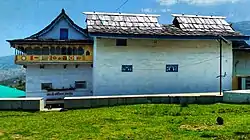 Clockwise from top: View of Kumarsain town from a nearby village, St. Mary's Church at Kotgarh village, View of Dhauladhar mountain range from Kumarsain, Koteshwar Mahadev Temple at Mandholi village, A meadow on the way to Derthu Mata Temple, Tani Jubbar Lake | |
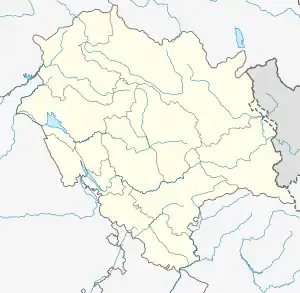 Kumarsain Location in Himachal Pradesh, India  Kumarsain Kumarsain (India) | |
| Coordinates: 31°19′05″N 77°26′46″E / 31.318145°N 77.446189°E | |
| Country | |
| State | Himachal Pradesh |
| District | Shimla |
| Elevation | 1,675 m (5,495 ft) |
| Population (2011) | |
| • Total | 5,461 |
| • Density | 2,711/km2 (7,020/sq mi) |
| Languages | |
| • Official | Hindi |
| Time zone | UTC+5:30 (IST) |
| PIN | 172029 |
| Vehicle registration | HP-95 |
Kumarsain (English: /kumærsæɪn/; Hindi: [kʊmaɾsain] ⓘ), also known as Kumharsain, is a town in Shimla District in the Indian state of Himachal Pradesh. Formerly under the British Raj, it was the capital of princely state of Kumharsain, which was one of the several states of the Punjab States Agency.[1]It is about 80 km from Shimla and famous for apple and cherry orchards.[2]
Kumarsain was founded in the 11th century A.D. as the capital of Kumharsain State. It was occupied by Nepal from 1803 to 1816, and by British India from 1839 to 1840.[3] Kumarsain lies 1 km beside National Highway 5 from Bharara village, which is 20 km from Narkanda towards Rampur Bushahr.
Geography
Kumarsain is located at 31°19′05″N 77°26′46″E / 31.318145°N 77.446189°E and has an average elevation of 1,675 metres (5,495 ft). It is situated above the Satluj river in the North-West Himalayas, about 80 km from Shimla towards interior ranges. Kumarsain has many villages within its boundary namely Mateyog, Damali, Lathi, Bharara, Bai and Dethal.

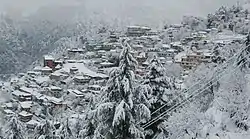
Tourist attractions around Kumarsain include Narkanda, Kotgarh-Thanedhar, Hatu Peak, Tani Jubbar Lake, Derthu Mata Temple
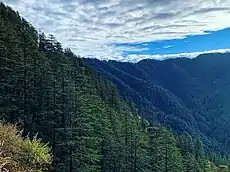
Government
Kumarsain was a Constituency of Himachal Pradesh Legislative Assembly and had a separate election seat until 2008 delimitation, when it was merged with Theog Assembly constituency. Veteran Congress Minister Vidya Stokes was elected 2 times as MLA in 2003 [4] and 2007 [5] from Kumarsain Assembly Constituency. Kumarsain is a tehsil[6] as well as a sub-division and comes under Narkanda Block.[7]
Demographics
As of 2011 India census,[8] Kumarsain had a population of 5,461. Males constitute 52% of the population and females 48%. Kumarsain has an average literacy rate of 97.8%, much higher than the national average of 74.04% male literacy is 97%, and female literacy is 89%. In Kumarsain 11% of the population is under 6 years of age.
History
Kirat Singh, also known as Kirti Singh (later Rana Kirat Chand), who was an office holder and Jagirdar at the court of Raja Narayan Pal of Gaya in Bihar, founded Kumharsain State in the 11th century AD. He along with his two brothers (Kartar Singh and Prithvi Singh) was driven away from Gaya, by the fear of Mahmud Ghaznavi and settled around Kumharsain. They conquered the country from a local chief named Bhambu Rai of Delath.[9] Later on Kirat Singh gave a tract called Karangla to his brother Kartar Singh. Descendants of Kartar Singh founded the states of Khaneti and Kotkhai. The younger brother, Prithvi Singh, established his independent state at Delath. Since the 15th century, Kumharsain was a feudatory of Bushahr State, but was declared independent after the expulsion of the Gurkhas in 1815, by a sanad dated February 1816, but at the same time lost its own tributary states of Bharauli, Balsan and Madhan. The Rana maintains a military force of 45 infantry and 1 gun (as of 1892).[10] Kumharsain State was ranked 6th in Order of precedence in the Shimla Hill States and 11th amongst the Punjab Hill States.[11][12]
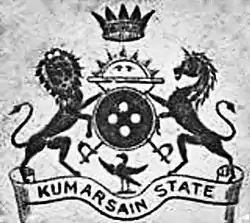

Kumarsain's famous Hira Mahal (named after the 56th Rana of Kumharsain, "Hira Singh"), which served as the home to the Ranas of this princely state, was burnt because of an accidental fire that took place in the mahal on 25 December 2007.[14]
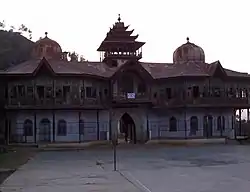
Also the first American apple tree grown in India was at Kotgarh (a village in Kumharsain tehsil), which was planted by an American immigrant Satyanand Stokes in 1916.[15]
References
- ↑ Hutchison, John; Vogel, Jean Philippe (1994). John Hutchison and JP Vogel, History of Punjab Hill States Lahore 1933. Asian Educational Services. ISBN 9788120609426.
- ↑ "Apple and Cherry cultivation in Himachal Pradesh".
- ↑ "Indian states before 1947 K-W". www.rulers.org. Retrieved 25 August 2019.
- ↑ "Himachal Pradesh legislative assembly election, 2003" (PDF). Retrieved 25 October 2013.
- ↑ "Himachal Pradesh legislative assembly election, 2007". Archived from the original on 4 March 2016. Retrieved 25 October 2013.
- ↑ "Tehsils in Shimla District".
- ↑ "Subdivisions & Blocks in Shimla District".
- ↑ "Census of India 2011: Data from the 2011 Census, including cities, villages and towns (Provisional)". Census Commission of India. Archived from the original on 16 June 2004. Retrieved 1 November 2008.
- ↑ Singh, Mian Goverdhan (1999). Wooden Temples of Himachal Pradesh. Indus. ISBN 9788173870941.
- ↑ "Kumharsain (Princely State)".
- ↑ Brentnall, Mark (2004). The Princely and Noble Families of the Former Indian Empire: Himachal Pradesh. Indus. ISBN 9788173871634.
- ↑ Verma, V. (1995). The Emergence of Himachal Pradesh: A Survey of Constitutional Developments. Indus. ISBN 9788173870354.
- ↑ "British Library (Online Gallery)".
- ↑ "300 years old palace in HP reduced to ashes".
- ↑ "Kotgarh "The apple bowl of India"".